Yet Untitled 139 - Notes on writing a contemporary YA drama series set in an all-girl college
By a man who's been out of his co-ed college for 22 years!
Dearest Yet Untitler,
The ride continues.
It took me six years of doing whatever it took to push ‘Ziddi Girls’ out into the world, but the world was much, much quicker in proclaiming its judgment on it. This can be quite scary, but thankfully, we’ve had it good.
I’ve been spending the past three weeks absorbing how viewers have responded to the series. I think I can say confidently now that audiences have received the show as - among other things - ‘authentic’ and ‘contemporary’. This has been the biggest source of relief, because I - the first writer through the gate on this one - was writing as an alien - someone not just from a different solar system than the subject matter but also from another time.
Faced with evidence that it happened, I’ve been giving some thought to how these contextual and temporal chasms were bridged. There was no dramatic precedence to this (like gazing into the cosmos with pertinent questions behind mine eyes); someone literally asked me to design an online knowledge-share webinar on “Crafting Authentic Contemporary Narratives” 🤪! So there I was, thinking about this all through the past week, quite undramatically in mundane fasion in the course of Uber rides.
I thought it was a worthwhile enterprise. Little did I expect that it might give me a possible YU instalment as well😁! So, here I am, using our little shared space to air out some of these thoughts before you. I’m very aware that much of what I relate below has been done before with great success, but for me it was an affirming journey that told me a lot about how I’d like to keep going with my work.
Here’s what I feel contributed to Ziddi Girls’ authenticity and topicality that people who have watched are commenting on:
Research
Going physically to the place where the story was set
Everything may already be on the internet, but nothing beats receiving your subject in person, especially if your subject is living.
In the case of Ziddi Girls, I met dozens of young women from Delhi University, across various colleges, and spoke extensively to them. As Gen Z says - it was a vibe. And I went looking for it in person.
Photographing extensively
How do you catch and bottle a ‘vibe’? Perhaps it’s impossible, because a vibe isn’t a tangible commodity. I feel it exists at the confluence of experience and the impulse that generates experience.
Going into the field gave me experiences: mood and tone. Photographs gave me the portal to revive the feelings I felt when I meet the subject. Photos like these:
More on feelings later 😂
Personal Investment
This is important.
My hook into a narrative about young women was that I’m a father of two young girls who will become young women in a few years. I went in with a deeply personal question: what’s the world like or going to be like for them as they grow?
Because it was personal, I cared more. It was easier for me to be empathetic. Also, I felt that I wasn’t simply gathering information and data. Clearly, I was dealing with something very relevant, even though on paper the subject matter initially felt so distant.
I just had to find a connection between me and it. I believe this is always possible, no matter how distant the subject.
Curiosity and Fascination
I found things in the world of all-girls colleges in Delhi University that genuinely fascinated me. The fact that the young women who spoke to me about how supportive and empathetic these spaces could be cornered my curiosity, having attended an all-boy boarding school that could sometimes be the opposite.
Also, when young women spoke to me about how they negotiated the perils of their age: the constant distractions of social media, the pressures of online perceptions, the shaming, trolling and hazards to mental health; I was genuinely moved by the systems they had created for themselves in order to not just survive, but thrive despite these pitfalls. “Phone pile” was one of my respondents’ methods of commanding her friends to shed their mobile phones in a gathering to engender being present. Hearing all this, I was in!
There is something amazing about a young person rising up to the challenges of their world independently. It filled me with courage and hope - not just reserved for my daughters, but such that I could use for myself as well!
Respectfully leaving ‘artefacts’ unfiltered
Of course, there were things that I encountered in my research that I did not understand immediately. Initially, I was under pressure to try and understand/process everything before putting it inside a narrative, but I think there is something to say about the fact that I resisted this.
Rather than trying to decipher, I tried to proceeded with fascination. Rather than trying to explain these new things that I had seen about the lives of young girls to my future collaborators, I focused on communicating my fascination. When the fascination carried from me to a collaborator, I knew it was worth going with. The writing would become the route to understanding, not vice versa. I’m happy that we went with this instinct, and that my collaborators trusted it, curtailing the need to decipher, running with the celebration of what excited us.
I think this is what kept us going for the six long years it took to get this series made!
In-depth interviews and what you get from them.
Interviewing people - in the true sense, I feel - means spending time with them. There was a particular interview I conducted with a group of third year sociology students that is worth relating here. I spent 4 to 5 hours with this group of young women in a paying-guest accommodation where, in the course of this interview, I heard stories about violated consent, about heartbreak, about friendship and about food. I focused, thankfully, more on feeling rather than recording. Yes, my hands were moving taking some notes, and occasionally I was clicking a photo or two, but I think the interview became a palpable moment of experiencing their collective feelings that I tried to preserve as unfiltered as I could.
This experience became a polestar that guided the writing. It was one of the the most precious ‘artefacts’ that the research yielded.
It was the vibe we needed for the series!
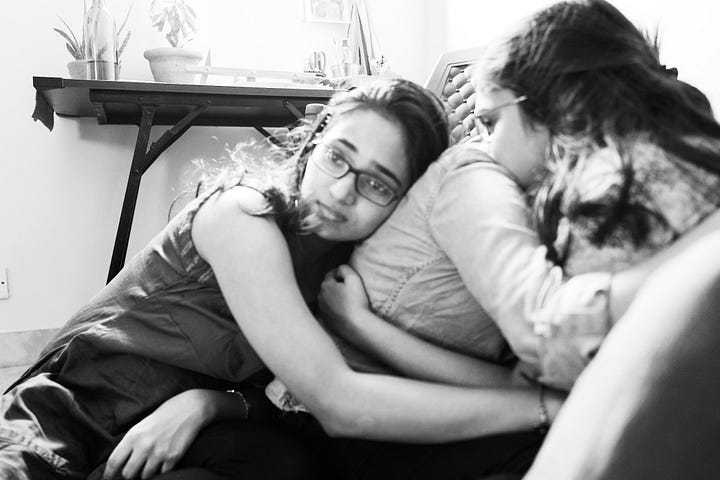
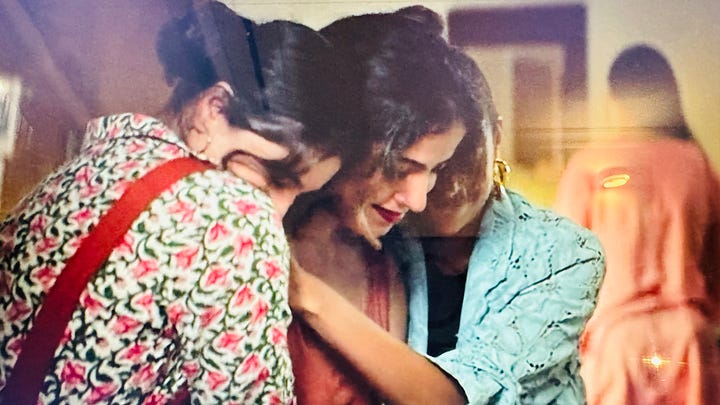
Isolating utterances
The interviews carried many utterances that triggered my fascination and curiosity. There were so many pithy sentences and statements that weren’t really stories in themselves but they pointed at bigger ideas that felt like they needed to have a place in the show.
One recent graduate referred to boys who entered her campus once a year for the annual college festival as “testosterone reservoirs”. You’ll find a direct reference to that in one of the later episodes of Ziddi Girls!

Immersion
Stories are experiential. You can’t experience something by standing on the sidelines. I really learnt the value of wading in as deep as I could go when researching this show. At the same time, I had to open the floodgates of memory and immerse myself in my own college experiences once again.
There were a lot of unresolved feelings I encountered, and I had a chance to address them. I suddenly had an answer for why I grew my hair long in my third year and started wearing kurta-pyjamas and carrying a jhola bag. I was testing out identities! This opportunity to try on various personas had not changed for the present day college students, and I could bridge across to them on the back of this very solid connection and tap in to a pool of my own very real feelings and experiences around the same.
I think it was important to acknowledge that while there were things I didn’t know about my subject matter, there were things I did know too. This interplay of confidence and humility became a dynamic dialogue in my head, one that kept propelling me forward. If you’re not confident, you cannot proceed, you get stuck! If you’re not humble, you go down too far down the wrong path and end up with hitting a false note.
Both things happened in getting ZG out there. I’m grateful that audiences found enough true notes for the false ones not to stand in their way while receiving the series.

Thank God, I did not have to do this alone. More on the shared journey later.
Respectful Understanding
At first, I used to be struck by how generous people were when they share their stories with me. While generosity is definitely a very important component of why they opened up, I also feel that they sensed an opportunity where they might be represented accurately and truthfully.
Even before trust was built, I felt that people seriously considered taking a chance. Perhaps, this time someone may end up representing them authentically. It’s so beautiful, opening up to someone for such a purpose. You take a chance on them, and they take a chance on you. It’s a beautiful relationship! Some of these relationships that I formed during the research endure still, and I am very happy about this!
Often I would ask them - ‘how would you like to see this aspect of what you relate on screen’. And they would tell me.
When I asked a group of girls - “what would you like to see in this story?” they answered: “Two girls getting high together”.
It’s all in there!
Writing
After research, I it wasn’t as if I entered a place of ‘knowing’. It was mostly a place where I felt better capable of filtering through what felt true and what didn’t, without necessarily knowing why - ‘this not that; that not this’.
Before the writing, I think it was useful to identify the things that I knew I would keep coming back to and keep them in the foreground. A lot of galleries, boards and shared online spreadsheets were created; many master documents full of text clippings and utterances.
There was a period when I felt lost in the material! When the first pages of the writing started emerging, often it felt like it didn’t resembled the things I’d been excited by at all! I have experienced this stage with almost everything I’ve written. It’s a desert that you have to cross.
Finding your ending
For me, this is a very important stage, and I think it’s something that you have to earn. Before the body comes to you, sometimes catch sight of the toes, an extremity, which is much better than catching sight of a knee or an elbow!
For me, finding an ending galvanises the process. After that, everything that excited you: every inspiration that you gathered becomes a stepping stone that you hop, skip and jump off towards creating the whole. You have to proceed with whatever level of skill you have at that stage (and I think, invariably, that this will forever feel inadequate!).
If I have an ending and it feels authentic to the material, then I have to build towards it with authenticity, else things will be mismatched.
We wrote more than we needed. Writing is a process of transformation, and at this stage you’re transforming your research into dramatic beats. Essentially, you’re creating a new set of raw material. Again, treading with caution so that you don’t distort the vibe while engaging in this, processing while constantly working to keep it all fresh and true.
I’ll say it again: I’m so happy that I did not have to do it alone. The more kindred spirits you have around you for the process, the more blessed the process shall be. Their eyes are your ticket to negotiating the false notes that will invariably arise from your limited perspective. At least some of them, anyway!
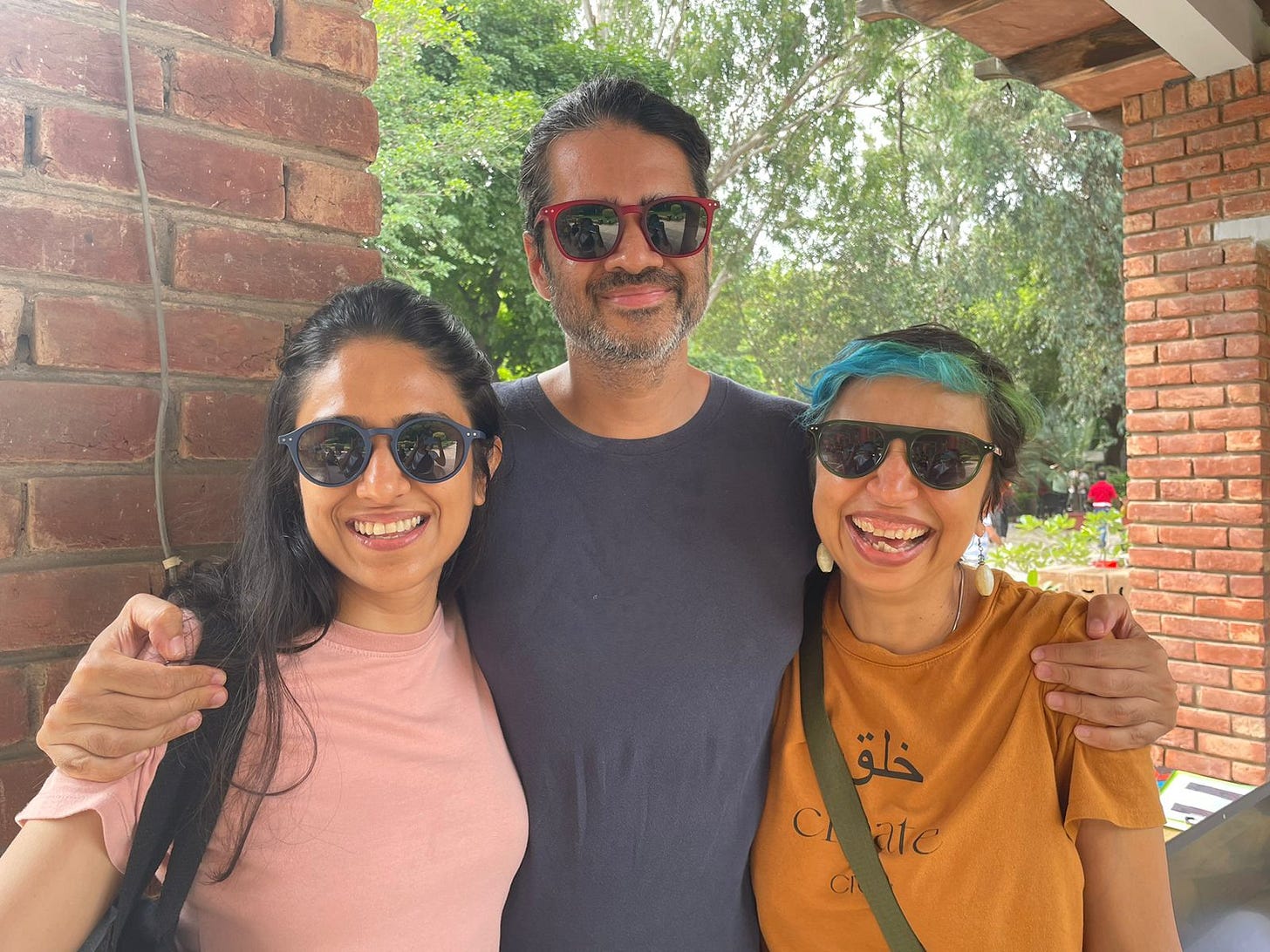
Of course, even your close collaborators will respond differently to the material than how you respond to it. I think what I always looked out for was genuine emotional response. In this way, the engine driving the thing forward keeps getting more and more powerful and the pool of experience you can tap into becomes deeper and deeper.
By the end of it all, we were working off a big reservoir of authentic lived-experience that fed into the show. The subject matter had brought the right bunch of people together. We were really lucky!
Prayer
Believe me, I can go on. But I’ll stop here.
Before I go, I’ll say this: the intent to get it right was there from the start. This is something that my collaborators and I never let go of. For me, this took the form of prayer, because the task felt so enormous initially.
We ran into many walls as we traversed this journey. But something sustained us. Every one of my collaborators brought along an indefatigable engine that kept them going. One fuel that powered my engine was prayer. A lot of prayer was behind the action that put Ziddi Girls together, piece by piece.
This poem came to me this week. It’s about prayer, so I’ll share it here - more or less in the original form it landed on the page in:
I say a prayer to bring rain where it’s needed, A prayer that makes another's prayer heeded. I pray for the healing of one broken in love, For rust on the cannon; for the flight of the dove. I pray for solace, I pray for peace, I pray for the estranged to inevitably meet. I pray for respite from this treacherous heat... I pray for the one grappling with defeat. I pray with my arm, my legs, and my heart, I pray for more prayers like this to start.
Thank you for listening, dearest Yet Untitler. And welcome to those newly subscribed! This is a two-way street where I love to hear from you. Drop me a line. A word. Anything!
Also,
Thank you. Lots of love,
V







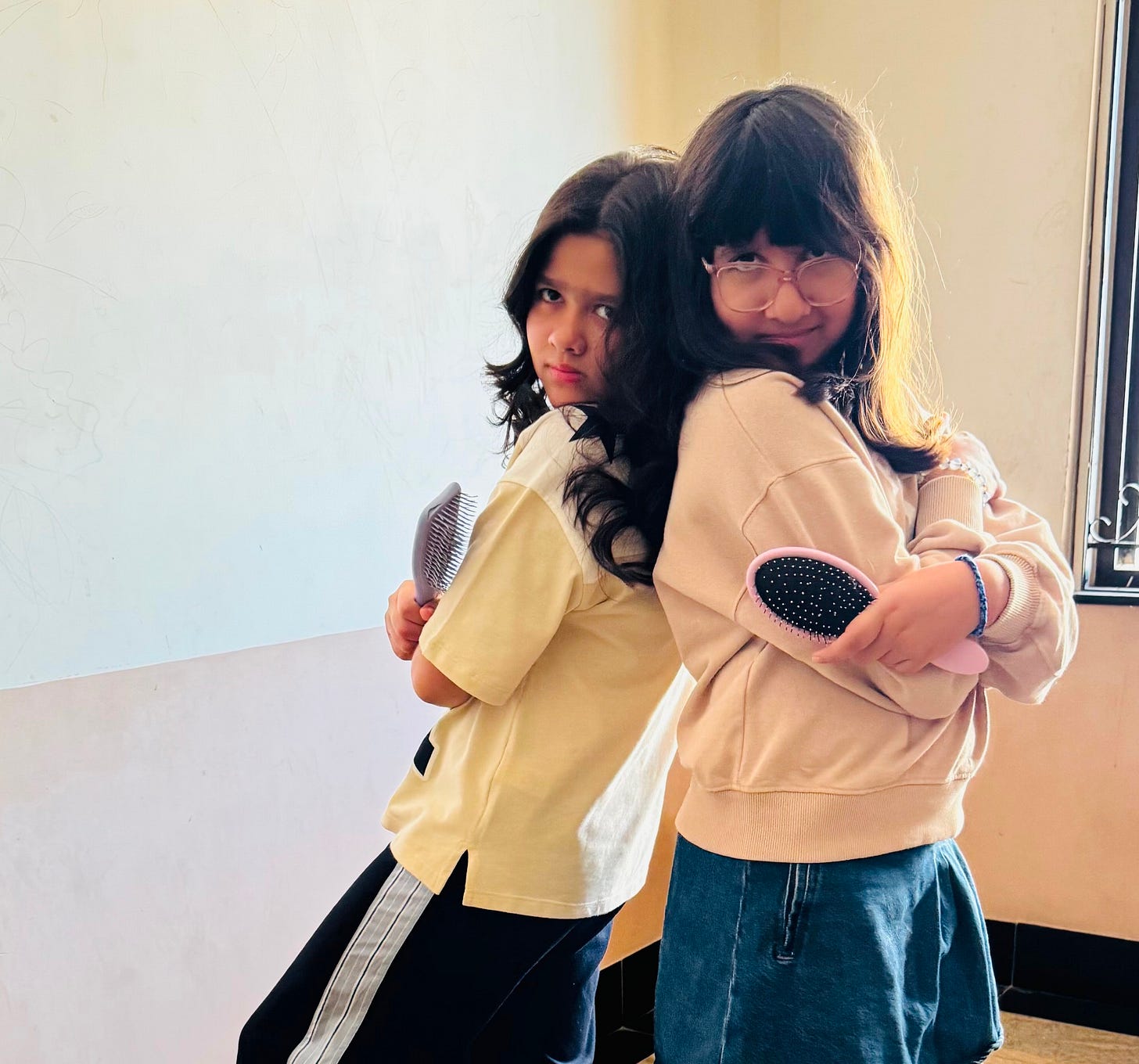


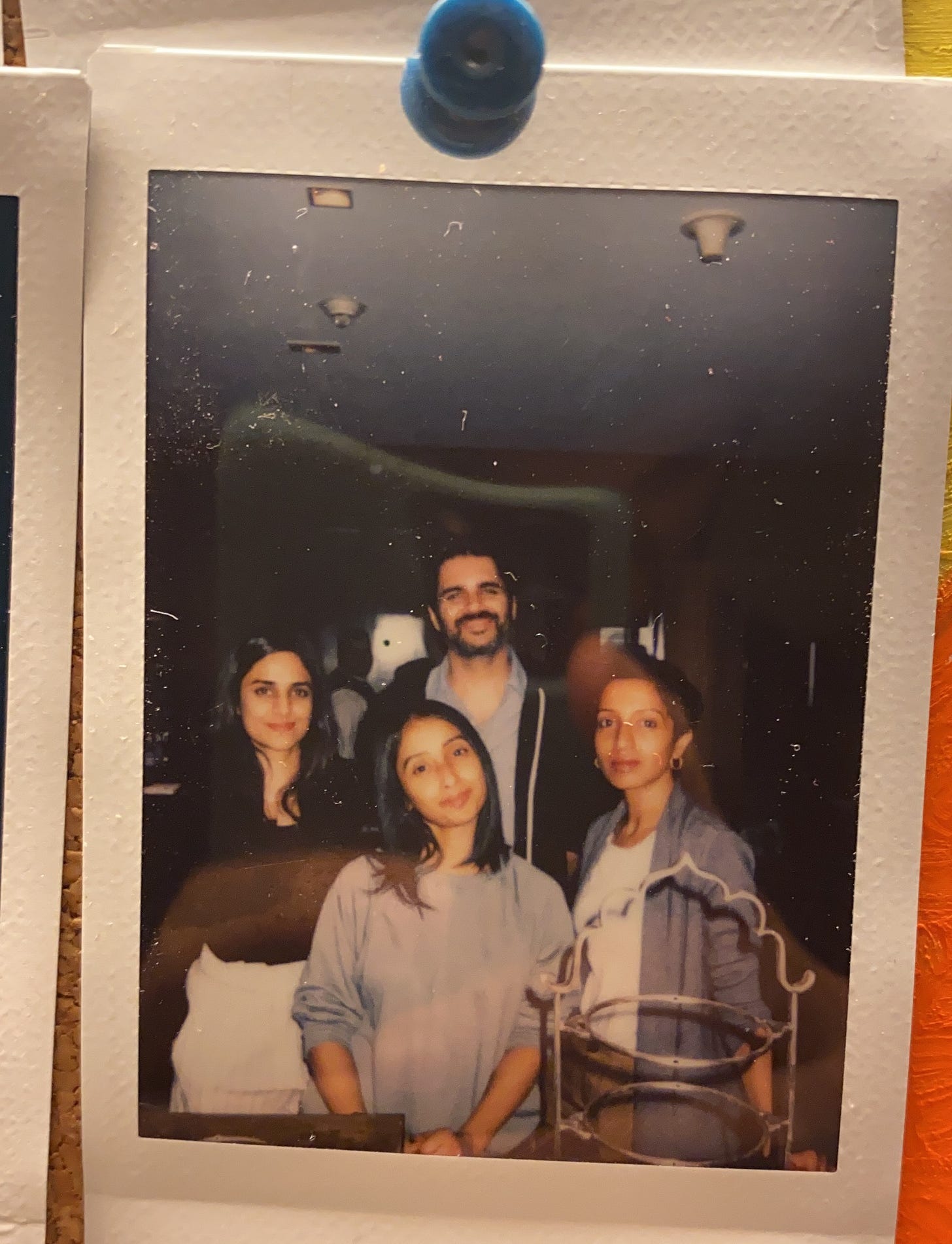
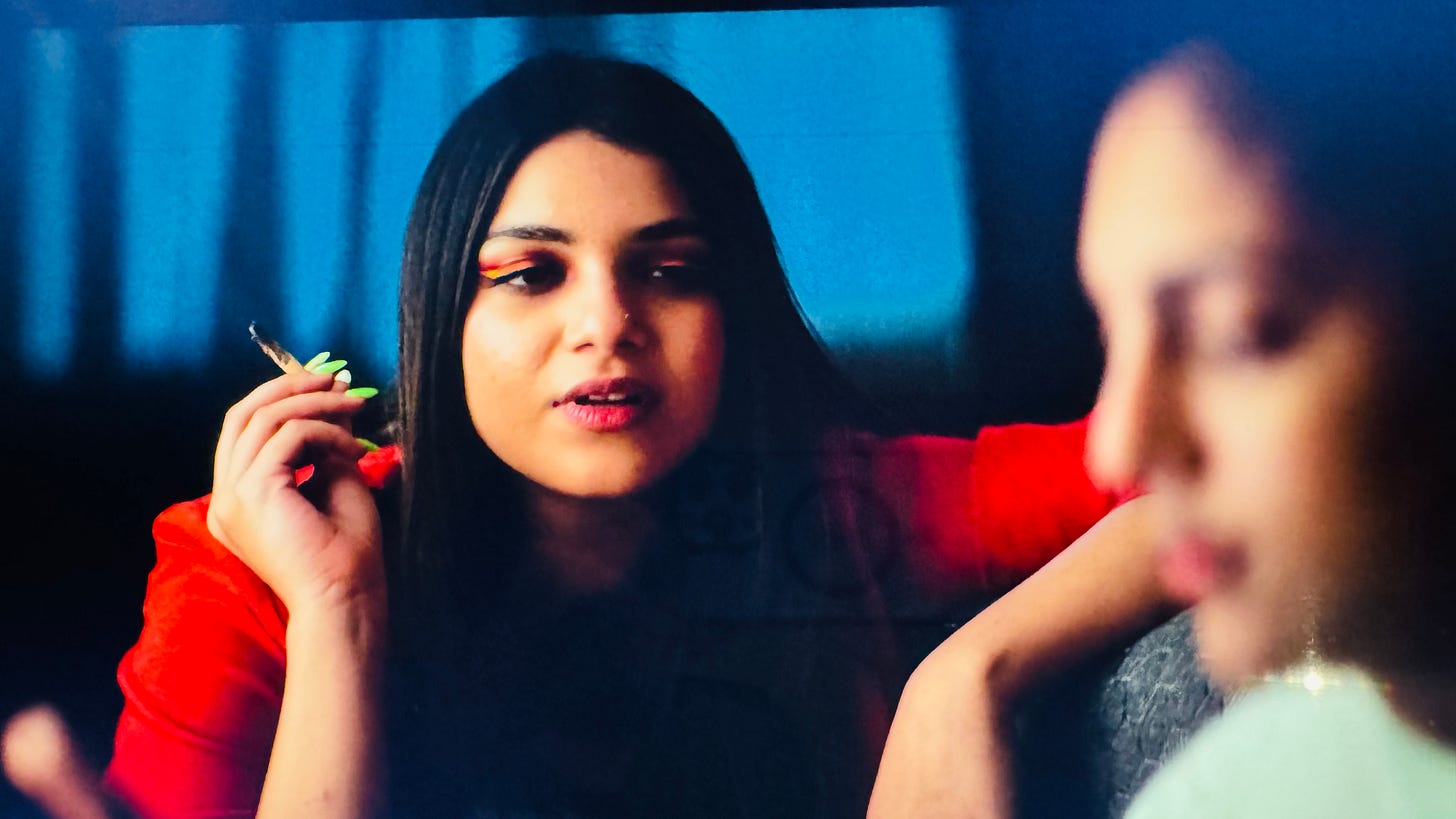
Beautiful article, appreciate the intimate insight into the whole process. Congratulations on the show, it felt real, and somewhat unhinged, which was a good thing!
Love seeing the effort which went into making this series !